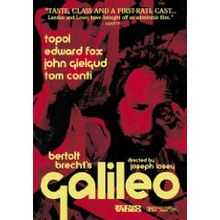Galileo (1974 film)
| Galileo | |
|---|---|
 DVD box art | |
| Directed by | Joseph Losey |
| Produced by |
Ben Baker Ely A. Landau |
| Written by |
Joseph Losey Barbara Bray |
| Starring |
Topol Edward Fox John Gielgud Tom Conti Margaret Leighton |
| Music by | Hanns Eisler |
| Cinematography | Michael Reed |
| Edited by | Reginald Beck |
Release dates | 1974 (UK) |
Running time | 145 minutes |
| Country | United Kingdom |
| Language | English |
Galileo is a 1974 film version of the Bertolt Brecht play The Life of Galileo. The film was produced and released as part of the American Film Theatre, which adapted theatrical works for a subscription-driven cinema series.
Plot
In 1609 Galileo Galilei is a mathematics professor in Padua, Italy. While his salary is inadequate, he possesses the freedom to pursue controversial scientific studies under the protection of the Venetian republic. Part of his work involves the use of a telescope, a relatively new scientific instrument brought from the Netherlands. Using the telescope, Galileo seeks to test the theories put forth by Nicolaus Copernicus that place the sun – and not the Earth – at the center of universe. As his research progress, Galileo accepts a more prestigious academic position in Florence, Italy. But his new position does not come with the government protection he enjoyed in Venice, and his friends in the higher echelons of the Roman Catholic Church refuse to come to his aid when he is summoned before the Inquisition.[1]
Production
Joseph Losey, the director of the film, also directed the first U.S. theatrical production of Galileo in 1947.[2] In his cinematic adaptation, Losey maintained several theatrical concepts that appeared in the theatrical version, including the use of a chorus of young boys who advance parts of the plot and the staging of Galileo’s recantation against a shadow-filled white screen. Losey’s opening shot, an overhead view of the film sound stage, also calls attention to the theatricality of the production.[1][2]
Release
Galileo was the initial offering of the American Film Theatre's second season.[2] At the time of the release, most critics reacted negatively to the performance by Topol as Galileo. Vincent Canby, writing in the New York Times, complained: “There is one problem with the film, and it is a major one; the casting of Topol in the title role…although he's a big man he imparts no sense of intellectual heft.”[2] Roger Ebert, writing in the Chicago Sun-Times, echoed the sentiment by noting: “The film's biggest weakness is the inexplicable casting of the Israeli actor Topol as Galileo. He acts in a fundamentally different tone from the other cast members, who are largely British and generally more capable.” [1] Jay Cocks, reviewing the film for Time, added: “Topol misses the role's strength, both in character and intellect. Most of the actors around him, however, are superb: John Gielgud, Margaret Leighton, Edward Fox, Patrick Magee, John McEnery.” [3]
The film was shown at the 1975 Cannes Film Festival, but wasn't entered into the main competition.[4]
Home video
A region 1 DVD of the film was released in 2003.[5]
References
- ↑ 1.0 1.1 1.2 "Galileo", Chicago Sun-Times, 1 January 1975
- ↑ 2.0 2.1 2.2 2.3 “'Galileo,' a Stage Piece, Opens Film Series,” New York Times, January 28, 1975
- ↑ "Genius is Outdone, Done In", Time Magazine, 10 February 1975.
- ↑ "Festival de Cannes: Galileo". festival-cannes.com. Retrieved 4 May 2009.
- ↑ Galileo (DVD). Kino Video. 11 November 2003.
External links
| ||||||